I found a recent survey that suggested that over 80% of Americans not only support minimum wage, but are in favor of increasing it! This disturbs me quite a bit. It's like Americans are engineering their own downfall.
Minimum wage laws are some of the most discriminatory laws out there. They hurt the people who need the help the most: the disadvantaged, the poorest, the uneducated, minorities who are discriminated against, etc.
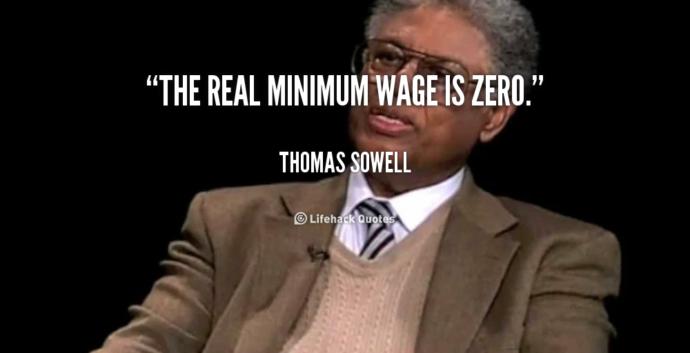
Helping the Poor
I don't think most Americans intend to hurt the most disadvantaged minorities when they support minimum wage. At least I hope that's not their intention. I believe it's because most Americans are misguided into believing that minimum wage helps poor people. Unfortunately a number of economists argue that the reality couldn't be further from the truth.
For a start, poor people aren't earning minimum wage. The homeless guy sleeping in an alley is not making $7.25/hour. He's making $0/hour, and most likely because no one would employ him at $7.25/hour. The people living on the streets are not making minimum wage.
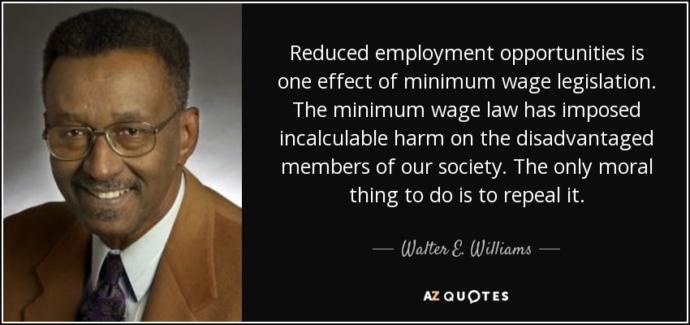
Walter E. Williams, an economist like Sowell, really means it when he says "incalculable harm". The damage these policies have done over generations is enormous and staggering to even begin to think about.

Job Ladder
For many poor people, the only way for them to move up in society is to climb up the job ladder starting from the bottom.
Poor people have no practical chance of becoming entrepreneurs and job creators. They have no startup capital to create a new firm. As a result, they have to seek jobs at whatever wages they can manage.
Unfortunately minimum wage has the effect of cutting off the bottom rungs of the ladder.
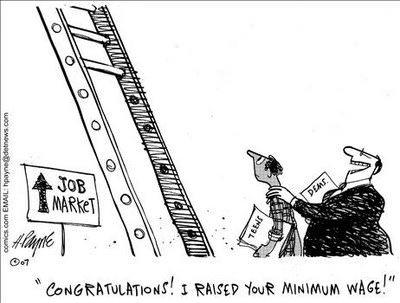
This ends up depriving those who most desperately needed a job of finding one, keeping them trapped in poverty and unemployment.
Anti-Competition
Any time the government sets price controls whether it's on domestic goods, imported goods, or on labor (minimum wage, i.e.), the ultimate intention and consequence is to bar out competition. It's an anti-competition measure intended to protect special interest groups. Keep this in mind no matter what politicians actually say.

Even if he was genuine in what he said, the practical effects of the policy on the economy deserve a translation:
Only the wealthiest and most successful business owners should be allowed in the market. Those who aren't rich and are struggling with their business should be put out of business. We also need to protect our beloved white construction workers from the blacks and the immigrants who are stealing their jobs by offering to work for lower wages.
His legacy was incredibly successful at accomplishing these goals.
Large businesses from wealthy owners already steeped in the industry increasingly swallowed up small, struggling businesses who had a more difficult time competing with minimum wage.
Most effectively, he managed to eventually make unemployment rates among black youths even higher than white youths.
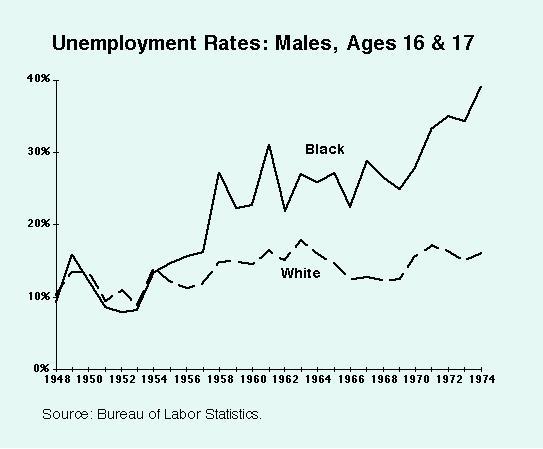
Price Controls
As mentioned, price controls are generally an anti-competitive measure from an economic perspective. For a simple example of how this works, let's consider what happens if we set a price control on cans of soda and require all of them to cost at least a dollar.
How do we sell this to the citizens so that enough people support these price controls? We can't simply tell them they're going to have to now pay at least $1.00 per can of soda and expect them to be happy about it. What should we do?
Aha! Let's tell them this is to promote their health and well-being. There might be enough people naive enough to fall for that kind of message.
Who Benefits?
Who benefits under this policy? Most likely the big name brands like Coca Cola will benefit the most who are already charging a high price per can of soda.
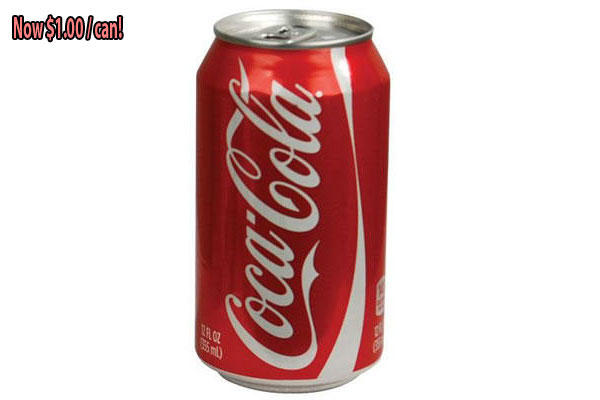
The reason is simple: the demand for their products is already exceedingly high, the company is already enormously successful enough to comfortably adjust to such changes, and their products might already go for such a price or close making the adjustment minimal.
Who Suffers?
Who suffers under this policy? Most likely the people producing the generic brands which cost much less than a dollar per can of soda, like 25 cents/can, will suffer the most.
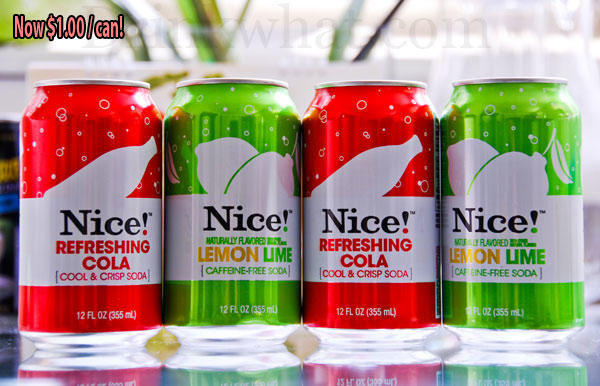
The reason is also simple: these products needed to be sold at a very low price to stand a chance of competing with the big name brands. When they are sold at exactly the same price, customers lose a lot of the incentive of choosing their products in the first place.
The likely outcome is that these products would be discontinued, the creators of these products would find themselves out of a job, and the big brands which survive will likely be more prosperous than ever before.
Minimum Wage
Minimum wage is the same overall concept, only we're setting price controls on labor instead of goods. Now consider what happens when an employer looks at these job applicants:
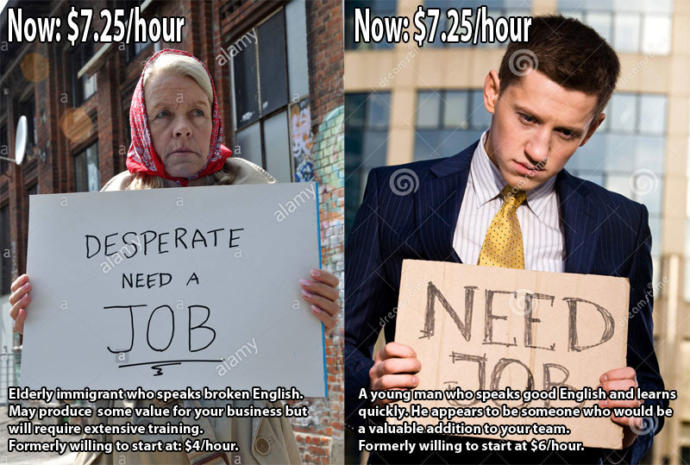
Who is likely to be hired now?
Sorry old woman. Here's some pocket change so that you can buy yourself a warm blanket for those cold winters on the streets.
It's not very different from the price control analogy above on cans of soda. When we use price controls, we end up protecting certain groups of people while pricing everyone else out of the market.

Aside from skill differences, discriminatory preferences come free of charge when we're dealing with minimum wage. When two job applicants both cost the same amount per hour to hire, an employer may favor a white person over a black person, a male over a female, a heterosexual over a homosexual, a Christian over a Muslim, a more attractive person over a less attractive person, etc.
Such employers are going to favor hiring based on these types of discriminatory preferences more when there's no economic incentive for them to hire outside of their preferences. There's less reason for them to think in terms of how much value an employee will contribute to their business when everyone costs the same amount to hire.
Unemployment Rates
Some economists have shown that modest increases to minimum wage (ex: in response to inflation) don't necessarily increase unemployment rates. If we look at coarse data on unemployment rates and labor participation rates from BLS, that appears to be true. Modest increases to minimum wage do not appear to lead to a net reduction of labor participation rates or an increase in unemployment rates.
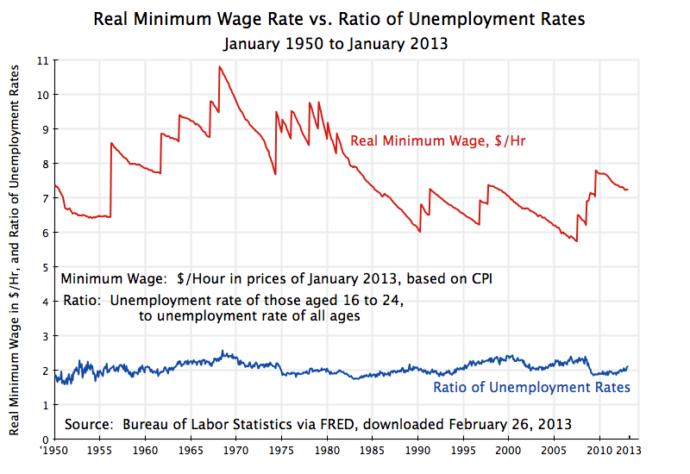
Nevertheless, one potential problem is that we're looking at the data at too coarse of a level. When we zoom in closer and analyze the effect of minimum wage laws on different social groups, we get a very different picture.

It is similar to what we predicted with the can of soda price control analogy. Customers might still be buying just as much soda if we zoom out and look at the big picture, but when we zoom in, we find that they are now predominantly favoring the big, popular brands of soda with the price controls in place.
The exact same type of thing happens under minimum wage. The black construction worker becomes replaced by the white construction worker when both workers cost the same to hire. From Eugenics and Economics in the Progressive Era:
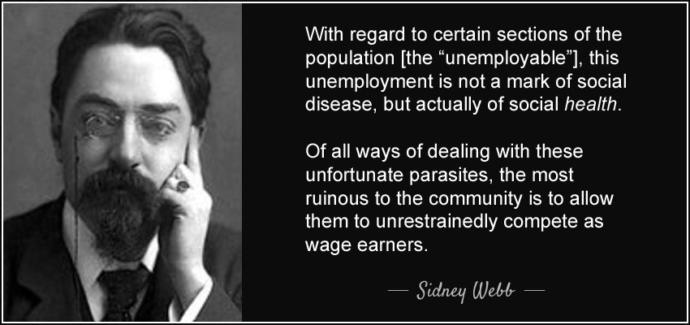
Entrepreneurs
One of the people who are hurt by minimum wage besides the obvious ones are entrepreneurs.
Take the example of a woman who worked for a decade to secure the money required to pursue her dream: to open up a small store. Her store produces only enough revenue for a modest profit margin, not even enough for her to live on. She ends up working a second job at night to support herself in addition to running the store single-handedly
.
She believes she can increase revenue if she can get some help and spend time focusing on ways to improve the popularity of her business and expand it. Unfortunately, she cannot afford to hire help at minimum wage. Even if there are people who share her vision and are willing to volunteer to work for her below minimum wage initially until her business starts doing better, she cannot accept such an offer as it would be illegal under minimum wage laws.
If we go back to FDR's quote:
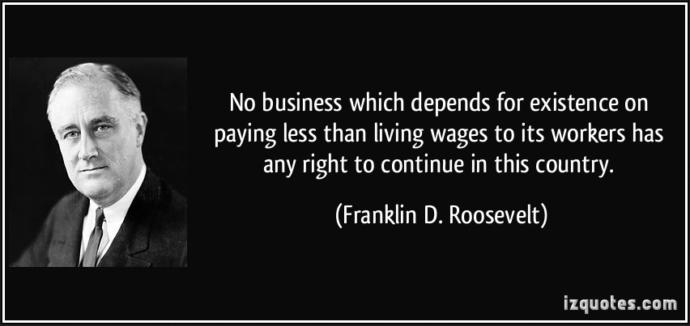
It starts to seem rather callous in such a context, doesn't it? Perhaps her dream should be shot down. Maybe her store should be replaced by yet another McDonalds or Starbucks. I find the idea very sad nevertheless.
With minimum wage laws in place, struggling business owners like her may soon find themselves trapped in a hopeless situation. They lose a great deal of flexibility to adjust wages according to what they can afford to pay their employees.
Race to the Bottom
I think another practical fear without minimum wage in place is that everyone will race to the bottom and earn the lowest wages imaginable, even if it allows even the most disadvantaged people in society to be employed.
There's the recurring idea of the greedy capitalist wanting to squeeze as much money out of his "slaves" while maximizing profit.
Yet if we look at BLS data, only ~2.7% of the labor force was earning minimum wage or less in 2016. The ones earning less are typically from states that do not enforce the federal minimum. Those people may simply find themselves unemployed if the states were required to enforce the federal minimum.
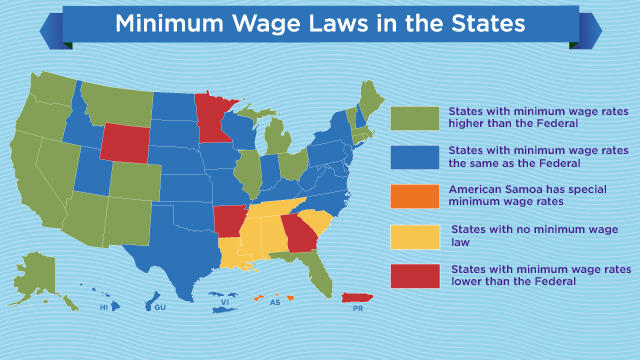
It doesn't follow that ~97.3% of the labor force would be earning more than minimum wage if every employer was a greedy scumbag and just wanted to pay people the absolute minimum. Even fast food joints often offer higher wages than the minimum.
If that was the case, we might not only need minimum wage laws, but also laws to guarantee promotions and raises. We've never needed such laws and, from that standpoint, I'd argue that we never needed minimum wage laws.
Mechanization
Aside from escalating minimum wage pricing disadvantaged minorities out of the market, it may also begin to increasingly price human beings in general out of the market.
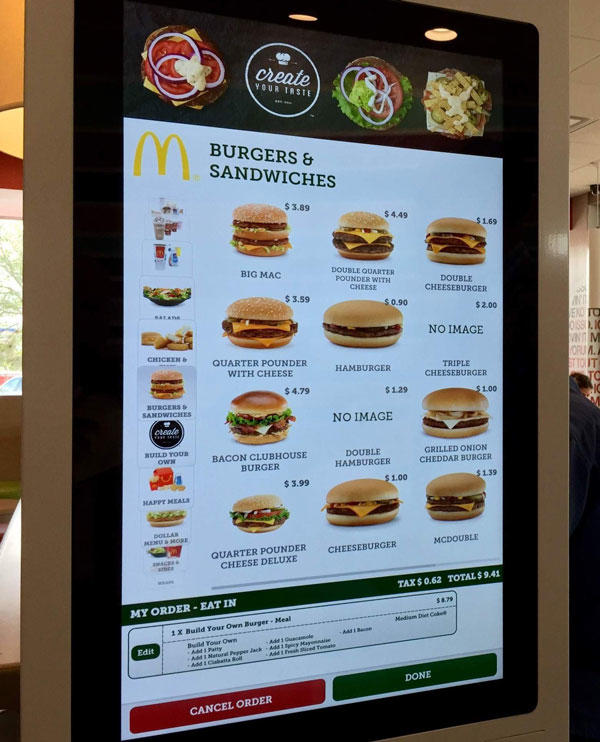
As the cost and productivity of a human worker starts dipping below the maintenance costs and efficiency of an inorganic alternative, machines will become increasingly popular as substitutes for human workers.
While this type of innovation is arguably a good thing for consumers and for the business owners, it's not going to be good if poverty and unemployment and crime escalates as a result of people being trapped in unemployment. We have to ensure that these people being replaced by machines have somewhere to go.
Unfortunately given that price controls like minimum wage are anti-competitive measures that reduce competition, the people who lost their jobs as a result of these machines may find themselves trapped in unemployment.
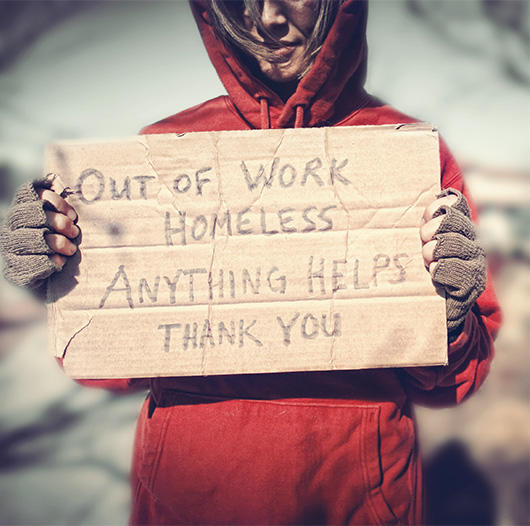
Conclusion
I hope I've made a case that at least challenges what some people think about minimum wage. It's not such a simple black and white issue.
As a caveat not all economists agree on what to do about minimum wage. Nevertheless, what they seem to unanimously agree upon is that minimum wage is not about helping the poorest, most disadvantaged people in society. If nothing else, I hope I've made a decent case that this is not what minimum wage is about.
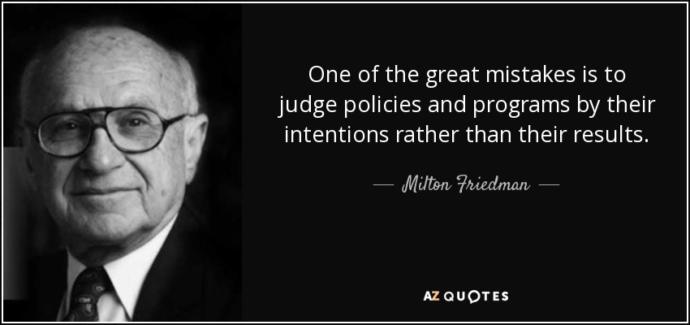
Some additional resources on the subject for those who are curious:
 Holidays
Holidays  Girl's Behavior
Girl's Behavior  Guy's Behavior
Guy's Behavior  Flirting
Flirting  Dating
Dating  Relationships
Relationships  Fashion & Beauty
Fashion & Beauty  Health & Fitness
Health & Fitness  Marriage & Weddings
Marriage & Weddings  Shopping & Gifts
Shopping & Gifts  Technology & Internet
Technology & Internet  Break Up & Divorce
Break Up & Divorce  Education & Career
Education & Career  Entertainment & Arts
Entertainment & Arts  Family & Friends
Family & Friends  Food & Beverage
Food & Beverage  Hobbies & Leisure
Hobbies & Leisure  Other
Other  Religion & Spirituality
Religion & Spirituality  Society & Politics
Society & Politics  Sports
Sports  Travel
Travel  Trending & News
Trending & News
Most Helpful Opinions